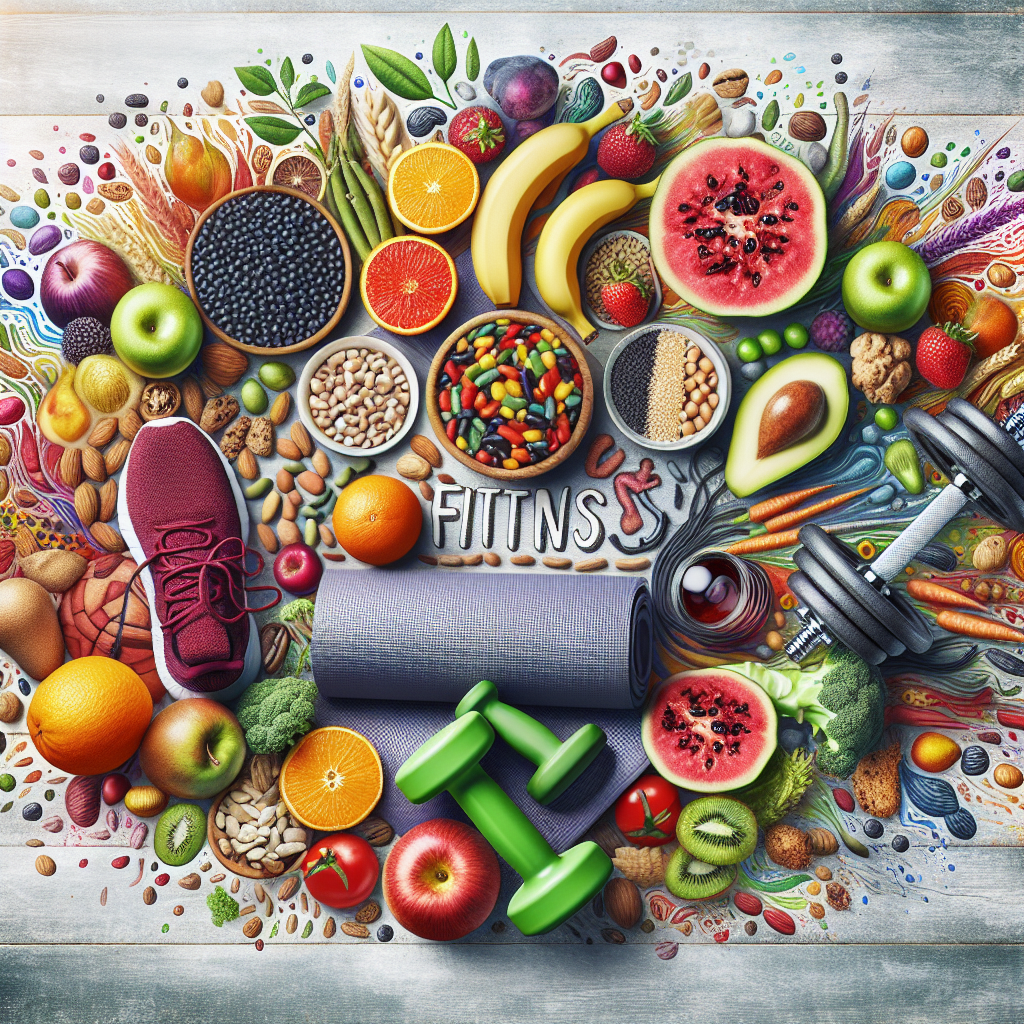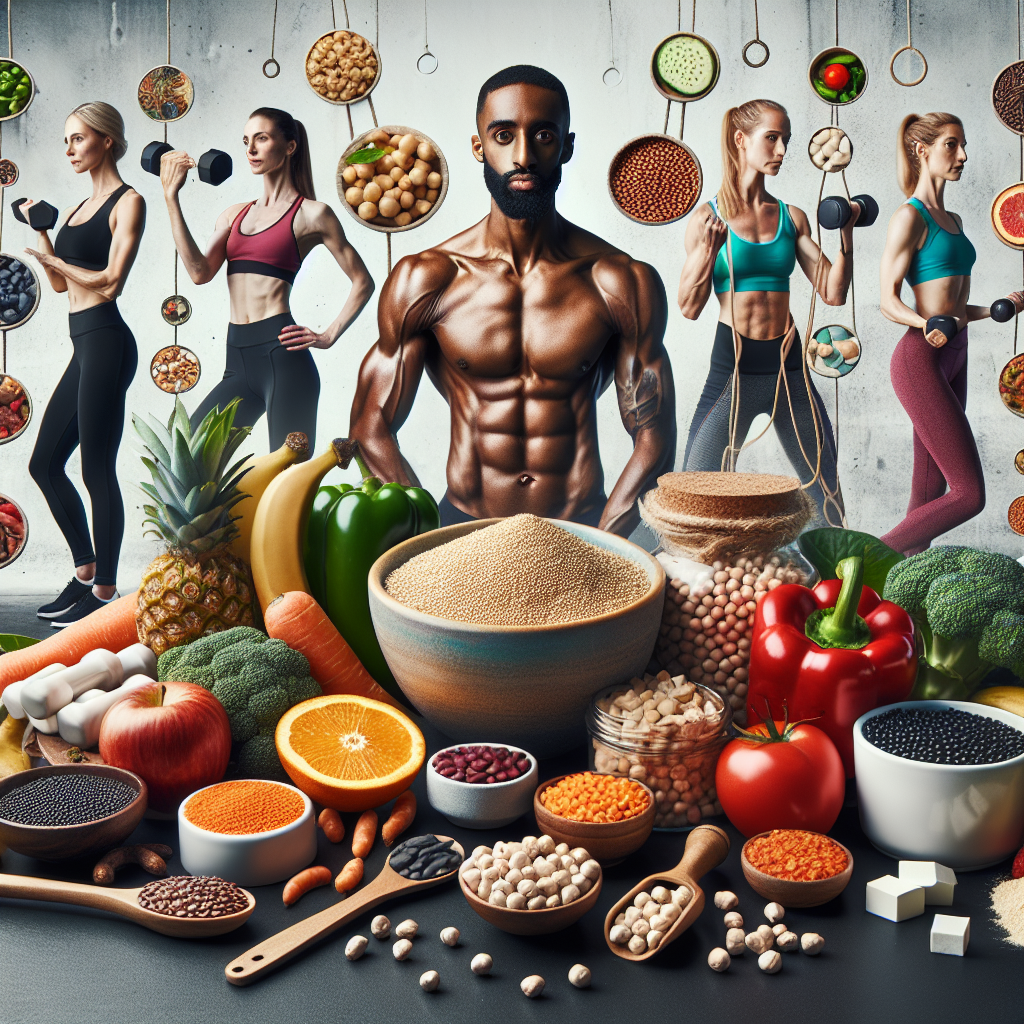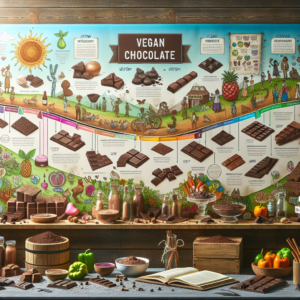Vegan Fitness: Introduction
In the world of fitness, there’s a growing movement that’s redefining the traditional notions of strength and endurance – it’s called Vegan Fitness. Embracing a plant-based lifestyle, individuals are discovering the power of nourishing their bodies while achieving their fitness goals.
With a focus on whole foods and cruelty-free choices, Vegan Fitness is not only transforming bodies, but also inspiring a compassionate approach to both personal well-being and the environment. Step into this exciting journey where health, fitness, and kindness align perfectly.
Benefits of Vegan Fitness
Improved overall health
Embarking on a vegan fitness journey can have a multitude of benefits for our overall health. By eliminating animal products from our diet, we consume less saturated fat and cholesterol, which can reduce the risk of heart disease and high blood pressure. Additionally, a plant-based diet tends to be rich in vitamins, minerals, fiber, and antioxidants, all of which promote good health and a strong immune system. We may also experience improved digestion, clearer skin, and better sleep as we adopt this lifestyle.
Weight management
One of the key advantages of vegan fitness is its positive impact on weight management. Plant-based diets are often lower in calorie density and higher in fiber compared to diets that include animal products. This means we can consume larger portions of food while still keeping our calorie intake in check, leading to increased satiety and better weight control. Additionally, vegan diets tend to be rich in complex carbohydrates, which provide sustained energy and can help regulate blood sugar levels, avoiding the spikes and crashes associated with unhealthy snacking.
Increased energy levels
Another wonderful benefit of adopting a vegan fitness lifestyle is the potential for increased energy levels. Plant-based foods are rich in complex carbohydrates which provide our bodies with the fuel they need to sustain physical activity. Additionally, the natural sugars found in fruits and vegetables can give us a quick energy boost when needed. By consuming a variety of whole foods and eliminating processed foods from our diet, we provide our bodies with the nutrients necessary for optimal energy production. This increased energy can translate into improved athletic performance, enabling us to push ourselves further and achieve our fitness goals.
Macronutrients for Vegan Athletes
Protein
Protein is an essential macronutrient for building and repairing tissues, including muscle tissue. Contrary to popular belief, it is entirely possible to meet our protein needs on a vegan diet. Plant-based protein sources include legumes such as lentils, chickpeas, and black beans, which are not only rich in protein but also in fiber and other essential nutrients. Soy products like tofu and tempeh are also excellent sources of plant-based protein. Additionally, seitan, made from wheat gluten, and the grain quinoa both offer substantial amounts of protein.
Carbohydrates
Carbohydrates are the primary source of energy for our bodies, especially during physical activity. Vegan athletes should prioritize complex carbohydrates, such as whole grains, legumes, and starchy vegetables like sweet potatoes and winter squash. These provide a steady release of energy and are packed with fiber, vitamins, and minerals. It is important to note that carbohydrates should not be feared or avoided when aiming for weight loss or improved athletic performance. The key is to choose nutrient-dense, whole food sources that support our overall health.
Fats
While carbohydrates are our body’s primary source of energy, fats are also important in a well-rounded vegan athlete’s diet. Healthy fats, including monounsaturated and polyunsaturated fats, can support brain health, hormone production, and the absorption of vitamins. Avocados, nuts, seeds, and their respective oils are excellent sources of these beneficial fats. It is important to choose unprocessed sources and to consume them in moderation as part of a balanced macronutrient intake.

Protein Sources for Vegans
Legumes
Legumes, including lentils, chickpeas, black beans, and many others, are an excellent source of protein for vegans. These versatile and affordable plant-based proteins are also high in fiber, iron, and other essential nutrients. Incorporating legumes into our diet can be as simple as adding them to soups, salads, or stir-fries, or even enjoying them in the form of hummus or bean-based dips.
Soy products
Soy products such as tofu, tempeh, and edamame are a staple in many vegan diets, and for good reason. Soy offers a complete protein profile, providing all the essential amino acids our bodies need. These plant-based protein alternatives are incredibly versatile and can be used in a variety of dishes, from stir-fries and curries to sandwiches and salads.
Seitan
Seitan, also known as wheat gluten, is a popular choice for vegans looking to increase their protein intake. Made from wheat protein, seitan has a texture similar to meat, making it a great option for mimicking meaty flavors and textures in dishes like stir-fries or vegan versions of classic comfort foods.
Quinoa
Quinoa is a grain that is not only rich in protein but also contains all nine essential amino acids, making it a complete source of plant-based protein. This versatile ingredient can be used as a base for salads, served as a side dish, or used in place of rice in various recipes. Quinoa is also gluten-free, making it a great option for those with gluten sensitivities or allergies.
Adequate Micronutrient Intake on a Vegan Diet
Vitamin B12
Vitamin B12 is an essential nutrient for vegans to pay close attention to, as it is primarily found in animal-based foods. While it is challenging to obtain adequate amounts of B12 solely through plant-based sources, there are fortified foods and supplements available. Fortified plant-based milks, breakfast cereals, and nutritional yeast often contain added B12. Alternatively, a B12 supplement can be taken regularly to ensure proper intake.
Iron
Iron is necessary for red blood cell production and oxygen transport throughout the body. Plant-based sources of iron include legumes, dark leafy greens, fortified breakfast cereals, and dried fruits such as raisins and apricots. To maximize our iron absorption, we can pair these iron-rich foods with sources of vitamin C, such as citrus fruits or bell peppers.
Calcium
Calcium is essential for maintaining strong bones and teeth, as well as proper muscle and nerve function. While dairy products are the most well-known source of calcium, there are plenty of plant-based options available. Dark leafy greens like kale and collard greens, tofu made with calcium sulfate, fortified plant-based milks, and calcium-fortified orange juice are all excellent sources of calcium for vegans.
Zinc
Zinc plays a vital role in immune function, protein synthesis, and wound healing. Plant-based sources of zinc include legumes, whole grains, nuts, and seeds. It is important to note that the absorption of zinc from plant-based sources may be slightly lower than from animal-based sources, so incorporating a variety of zinc-rich foods into our diet is key.
Omega-3 fatty acids
Omega-3 fatty acids have numerous health benefits, including reducing inflammation, supporting brain health, and promoting heart health. While they are commonly found in fatty fish, vegan sources of omega-3 fatty acids include flaxseeds, chia seeds, hemp seeds, walnuts, and algae-based supplements. Ensuring a regular intake of these sources can help maintain optimal omega-3 levels.

Meal Planning for Vegan Athletes
Pre-workout meals
Pre-workout meals should focus on providing sustained energy and adequate macronutrients to fuel our workout. A combination of complex carbohydrates and a moderate amount of protein can help provide lasting energy and support muscle function. Examples of pre-workout meals for vegan athletes could include a bowl of oats topped with almond butter and sliced bananas, a whole grain wrap filled with tofu and mixed vegetables, or a smoothie made with plant-based protein powder, fruits, and greens.
Post-workout meals
Post-workout meals are crucial for replenishing energy stores and aiding in muscle recovery. Rapidly digestible carbohydrates and a moderate amount of protein can help optimize recovery. Options for post-workout meals could include a sweet potato with black beans and avocado, a quinoa salad with grilled tempeh and mixed vegetables, or a protein-packed smoothie with almond milk, berries, and a scoop of vegan protein powder.
Snacks
Snacks are an important part of a vegan athlete’s meal plan, providing additional nutrients and satisfying hunger between meals. Optimal snacks should contain a mix of carbohydrates, protein, and healthy fats. Some examples of vegan snacks for athletes include fresh fruit with nut butter, a handful of mixed nuts and seeds, hummus with carrot sticks, or a plant-based protein bar.
Hydration for Vegan Athletes
Importance of staying hydrated
Staying properly hydrated is essential for overall athletic performance and general health. Water is involved in numerous bodily functions, such as regulating body temperature, cushioning joints, and transporting nutrients and waste. For vegan athletes, staying hydrated is particularly important as plant-based diets tend to be higher in fiber, which requires adequate hydration for optimal digestion. Dehydration can lead to decreased energy levels, impaired cognitive function, and poor exercise performance.
Plant-based hydration options
Plant-based hydration options are plentiful and provide a variety of additional nutrients to support overall health. Fresh fruits and vegetables with high water content, such as watermelon, cucumbers, and oranges, can be hydrating snack choices. Herbal teas, coconut water, and homemade electrolyte drinks made with a combination of water, citrus juice, and a pinch of sea salt can also help replenish electrolytes lost during exercise.

Supplements for Vegan Athletes
Vitamin B12
As mentioned earlier, vitamin B12 can be challenging to obtain solely through plant-based sources. Therefore, a B12 supplement is highly recommended for vegan athletes to ensure sufficient intake of this crucial nutrient. Several forms of B12 supplements are available, including tablets, sublingual drops, and fortified foods.
Iron
While it is possible to obtain adequate iron intake through a well-planned vegan diet, some athletes, especially females, may require supplementation to ensure optimal levels. If blood tests reveal an iron deficiency or if symptoms of iron deficiency, such as fatigue and weakness, persist, it is important to consult a healthcare professional for guidance on iron supplementation.
Omega-3 fatty acids
Omega-3 fatty acid supplements derived from algae are an excellent choice for vegan athletes looking to support cardiovascular health and reduce inflammation. Algae-based supplements provide a direct source of EPA and DHA, the two primary omega-3 fatty acids found in fish oil. These supplements are a sustainable and cruelty-free option for those following a vegan lifestyle.
Creatine
Creatine is a naturally occurring compound found in small quantities in animal products, primarily meat. Vegan athletes who wish to supplement with creatine can choose a vegan-friendly option derived from plant sources, typically made from fermented starches such as corn or rice. Creatine supplements can help improve strength and power output, making them a popular choice amongst athletes.
Building Muscle on a Vegan Diet
Effective workout routines
Building muscle on a vegan diet requires an effective workout routine that combines resistance training and progressive overload. Incorporating a mix of compound exercises, such as squats, deadlifts, and bench presses, and isolation exercises that target specific muscle groups can help stimulate muscle growth. Working with a qualified personal trainer or strength and conditioning coach can assist in developing a customized workout routine tailored to individual goals and abilities.
Nutrition strategies for muscle growth
In addition to a well-rounded workout routine, proper nutrition is essential for building muscle on a vegan diet. Consuming enough total calories and ensuring an adequate intake of protein is crucial. As mentioned earlier, plant-based protein sources such as legumes, soy products, seitan, and quinoa can provide the necessary amino acids to support muscle growth. It is also important to spread protein intake throughout the day to optimize muscle protein synthesis. Eating balanced meals that contain a mix of carbohydrates, proteins, and fats, as well as incorporating snacks between meals, can help meet increased nutrient needs for muscle growth.

Maintaining Energy Levels during Training
Balanced macronutrient intake
Maintaining balanced macronutrient intake is key to sustaining energy levels during training. Consuming a mix of carbohydrates, proteins, and fats in the right proportions can provide sustained energy throughout our workouts. Carbohydrates provide readily available energy, while proteins support muscle recovery and growth, and healthy fats help regulate hormones and support overall health. Experimenting with different macronutrient ratios and timing can help identify what works best for individual energy needs.
Timing meals and snacks
Timing meals and snacks appropriately can help maintain energy levels during training. Consuming a pre-workout meal or snack around 1-2 hours before exercise can provide a steady release of energy. Post-workout meals and snacks should be consumed within the first hour after finishing exercise to aid in muscle recovery and replenish glycogen stores. Additionally, having small, nutrient-dense snacks on hand during longer training sessions can help prevent energy dips and promote consistent performance.
Importance of adequate rest
While proper nutrition and hydration are essential for maintaining energy levels during training, it is equally important to prioritize adequate rest. Our bodies require time to recover and repair from intense workouts. Aim for quality sleep each night to support the recovery process. Additionally, listen to our bodies and allow for rest days as needed. Overtraining and pushing ourselves too hard without giving our bodies proper time to recover can lead to decreased energy levels and increased risk of injury.
Plant-Based Diet for Endurance Athletes
Optimal fueling strategies
Endurance athletes rely heavily on carbohydrates for sustained energy during prolonged exercise. A plant-based diet can provide the necessary carbohydrates to fuel endurance activities. Incorporating whole grains, legumes, fruits, and vegetables into meals and snacks can ensure an adequate intake of complex carbohydrates. Fueling strategies may include consuming a carbohydrate-rich meal or snack before and during longer training sessions or races to maintain energy levels.
Carbohydrate loading
Carbohydrate loading is a strategy employed by many endurance athletes to maximize glycogen stores in preparation for a race or long-duration event. This involves consuming a high-carbohydrate diet for several days leading up to the event. Plant-based sources of carbohydrates, such as pasta, rice, bread, potatoes, and fruits, can be incorporated into meals leading up to the event. It is important to also ensure adequate hydration during this time to support optimal carbohydrate storage.
In summary, adopting a vegan fitness lifestyle can provide numerous benefits for overall health, weight management, and increased energy levels. By ensuring adequate intake of macronutrients, focusing on plant-based protein sources, and incorporating a variety of fruits and vegetables into our diet, we can meet our nutritional needs as vegan athletes. Proper supplementation, meal planning, hydration, and rest play crucial roles in supporting our athletic performance and muscle growth. With proper planning and attention to our dietary needs, vegan athletes can thrive and achieve their fitness goals.





